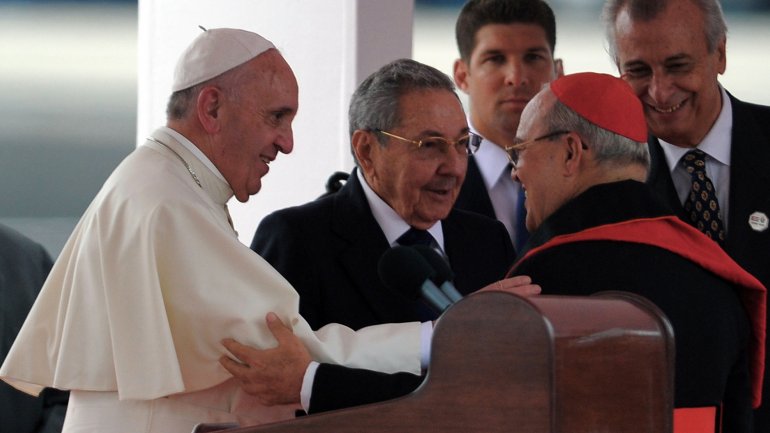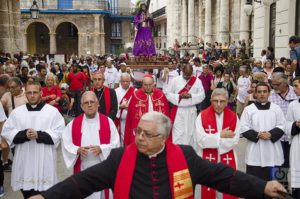The Catholic Church broke his political silence of the last few months in Cuba and returned to the charge with old claims to the Government: access to the educational system and greater presence in the public media.

Raúl Castro, President of Cuba maintains the prohibition that dates from the early days of the Cuban revolution.
“The Church wants to have schools or spaces in the schools, what you want also to a considerable part of the people”, said the new Archbishop of Havana, Juan de la Caridad García, “New word” magazine, published by the Archdiocese.
Garcia replaced as Archbishop of Havana Cardinal Jaime Ortega last May.
In 1961, in the midst of strong contradictions with the Catholic hierarchy, Fidel Castro’s Government nationalized the entire system of education, which deprived the Church of its numerous schools, its main source of income.
The new atheist state education became public and universal, preventing all access or influence to the Church.
In parallel, in Cuba the press is under State control since the 60s, and only the Church has some modest means for the dissemination of the faith in temples.
The Church “wishes to have access to the social media on an ongoing basis”, said Garcia.
The Church-State tensions survived undulating shape for decades until 1998, when the Pope Juan Paul II made his historic visit to Cuba.
Since then, the priests have access to radio or television on the occasion of the religious celebrations, or press publishes timely releases Catholic.
Both parties began in May 2010 a new dialogue, which resulted in the release of more than 130 political prisoners and a greater public presence of the Church.
Raúl Castro’s Government has returned to the Church some properties seized in the 60’s, but seems unwilling to grant access to education and the media.
The Church also “want to have active and public part in education for the virtues that remove vices and the promotion of harmony among all Cubans, and want to talk about all this, or at least gradually,” Garcia said.
The Archbishop took the opportunity to condemn the legal practice of abortion in Cuba. “Abortion is the first violation of human rights,” he said.
Agencies/TVN/Internet Photos / Arnoldo Varona/TheCubanHistory.com
THE CUBAN HISTORY, HOLLYWOOD.
FOLLOW US ON TWITTER AND FACEBOOK. THECUBANHISTORY.COM
IGLESIA CATOLICA CUBANA RECLAMA AL GOBIERNO ACCESO A LA EDUCACIÓN Y MEDIOS.
La Iglesia Católica rompió su silencio político de los últimos meses en Cuba y volvió a la carga con viejos reclamos al Gobierno: acceso al sistema educacional y mayor presencia en los medios públicos.

Raúl Castro, presidente de Cuba mantiene la prohibición que data de los inicios de la revolución cubana.
“La Iglesia quiere tener escuelas o espacios en las escuelas, lo que también desea una parte considerable del pueblo”, dijo el nuevo Arzobispo de La Habana, Juan de la Caridad García, a la revista “Palabra Nueva”, que publica el arzobispado.
García sustituyó en mayo pasado al cardenal Jaime Ortega como Arzobispo de La Habana.
En 1961, en medio de fuertes contradicciones con la jerarquía católica, el gobierno de Fidel Castro nacionalizó todo el sistema de enseñanza, con lo cual privó a la Iglesia de sus numerosas escuelas, su principal fuente de ingreso.
El nuevo estado ateo convirtió la enseñanza en pública y universal, impidiendo todo acceso o influencia a la Iglesia.
En paralelo, en Cuba la prensa está bajo control estatal desde la década de los años 60 y solo la Iglesia tiene algunos modestos medios para la difusión de la fe en templos.
La Iglesia “desea tener acceso a los medios de comunicación social de manera continua”, enfatizó García.
Las tensiones Iglesia-Estado sobrevivieron de forma ondulante durante décadas hasta 1998, cuando el papa Juan Pablo II hizo su histórica visita a Cuba.
Desde entonces, los sacerdotes tienen acceso a la radio o la televisión en ocasión de las celebraciones religiosas, o la prensa publica puntualmente comunicados católicos.
Ambas partes iniciaron en mayo de 2010 un inédito diálogo, que derivó en la excarcelación de mas de 130 presos políticos y una mayor presencia pública de la Iglesia.
El gobierno de Raúl Castro ha devuelto a la Iglesia algunos inmuebles incautados en la década de los 60, pero no parece dispuesto a conceder acceso a la educación y a los medios.
La Iglesia también “desea tener parte activa y pública en la educación para las virtudes que quiten vicios y en el fomento de la concordia entre todos los cubanos, y quiere dialogar sobre todo esto o al menos paulatinamente”, dijo García.
El arzobispo aprovechó para condenar la práctica legal del aborto en Cuba. “El aborto es la primera violación de los derechos humanos”, dijo.
Agencies/TVN/Internet Photos/ Arnoldo Varona/TheCubanHistory.com
THE CUBAN HISTORY, HOLLYWOOD.






